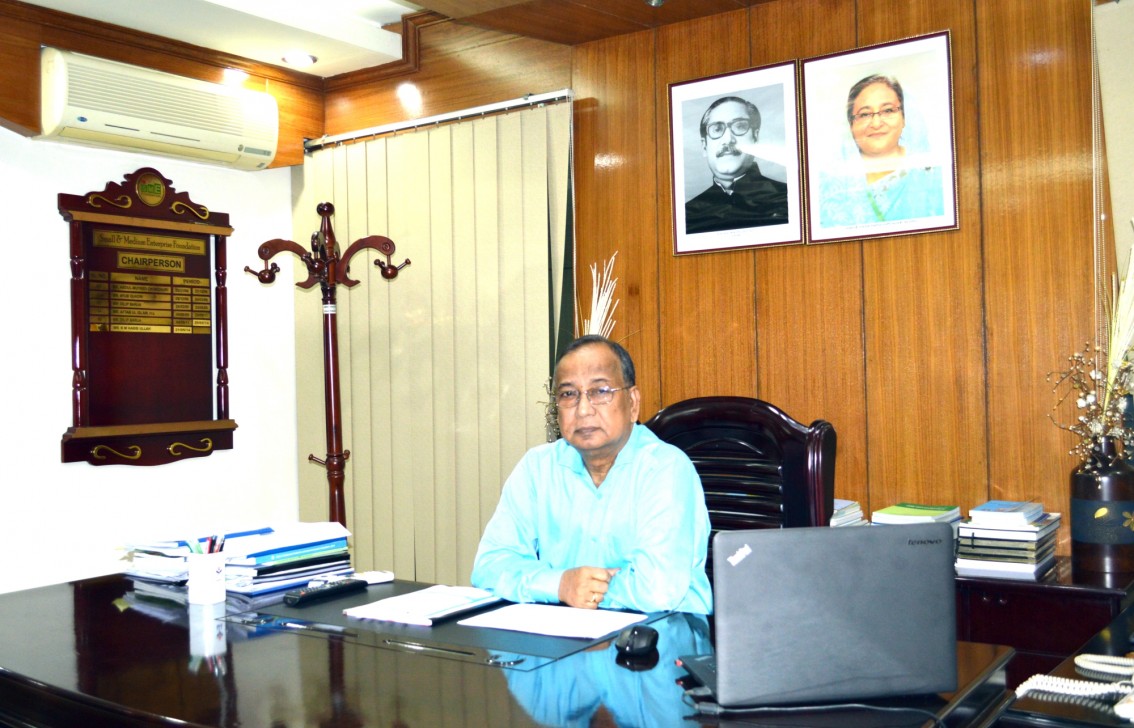Focus more on SMEs to be a developed nation

Bangladesh hould give more focus on small and medium enterprises to materialise its vision of becoming a developed nation by 2041, SME Foundation Chairperson KM Habib Ullah said.
“If we really want to make it within the timeframe, we will have to focus on small and medium enterprises. There is no alternative to the SMEs.”
It is not possible for a populous country like Bangladesh to provide jobs to everybody or to engage everyone in farming due to scarcity of lands, he said.
Moreover, there is capital shortage to restrict the country to go for massive industrialisation, he said.
“So, developing the SME sector is the way forward,” Habib Ullah told The Daily Star in an interview recently.
With an endowment fund of Tk 200 crore, the government established the not-for-profit organisation in 2007 that works to promote and develop SMEs.
The fund has been kept with a number of banks as deposits and the foundation uses the interest income from the deposits to extend loans to the entrepreneurs.
At present, the country has around one crore SMEs and they are the bedrock of the economy, Habib Ullah said.
SMEs account for about 45 percent of manufacturing value addition, about 80 percent of industrial employment, about 90 percent of total industrial units and about 25 percent of the labour force, according to a planning ministry document.
Their total contribution to export earnings varies from 75 percent to 80 percent, he said.
The industrial sector makes up 31 percent of the country’s gross domestic product, most of which comes from the SMEs, he said.
Japan and South Korea have become developed nations by developing their SME sector and now Malaysia, Singapore, Thailand, India and China are following the suit, Habib Ullah said.
He said the SME Foundation is suffering from lack of funds to disburse among the SMEs.
As of June 30 this year, the foundation lent Tk 85.75 crore in loans, which was around Tk 50 crore at the end of 2015.
The size of the loans ranges from Tk 50,000 to Tk 10 lakh. In special cases, the amount can be a maximum Tk 20 lakh.
“Our area is very vast but our capability is very little.”
The national budget for 2019-20 was disappointing for Habib Ullah, as there was no set-aside fund for the foundation while Tk 10 crore had been allotted in the previous budget for 2018-19.
“So, our capacity to boost the SME sector has reduced. It is not possible to run at a high speed with such low amount of funds.”
However, overall SME lending is growing in Bangladesh.
At the end of March 2019, SME loan disbursement rose 2.10 percent year-on-year to Tk 197,718 crore, which was 19.63 percent of the total loans disbursed, according to Bangladesh Bank data.
Habib Ullah said India and Malaysia have set up dedicated banks to cater for the SMEs and reduce misuse of such loans.
“Bangladesh can think of such a bank. The foundation can work on this purpose to accommodate the SME loans of all banks.”
SMEs suffer from capital shortage and struggle in getting low-cost loans, as banks do not extend loans to them easily.
“Nevertheless, if they get a loan after so much effort, the interest rate remains very high. None gets the loan at single digits. Only, the SME Foundation lends at a single digit.”
The foundation provides loan through banks at 9 percent and it comes down to 8.5 percent for women. The recovery rate is 100 percent.
Habib Ullah said a huge amount of SME loans is going to home, construction and many other sectors.
Another problem the SMEs are confronted with is the spiralling cost of production, he said.
The cost of production will have to be reduced so that SMEs can compete with foreign products and to do that they need low-cost loans, he said.
Smuggling of foreign products into Bangladesh has to be stopped, according to the chairperson.
Many cheap products are smuggled into the country through illegal routes, which come as a blow to the local SMEs, he said.
Habib Ullah suggested SMEs should take benefit of the latest technologies to cut production cost.
“SMEs need proper training and technological support to improve the quality of their products.”
SMEs also face problems when it comes to product standardisation, so the government should set up a dedicated laboratory to certify the products produced by the SMEs.
As many SMEs do not have showrooms, they cannot market their products.
To solve the problem, the foundation organises fairs every year allowing SMEs to display products. Last year, it organised expositions in 23 districts and a national fair in Dhaka.
The foundation has already sought land from the government to set up exhibition halls for SMEs in all divisions.
As per the plan, one exhibitor will be allowed to showcase their products for 15 days so that all the producers can avail the display opportunity.
Habib Ullah said SMEs are facing many other problems and the SME Foundation can solve all of them.
“But we can only materialise the plans we have to solve the problems if we are provided with funds and our capacity is enhanced.”
